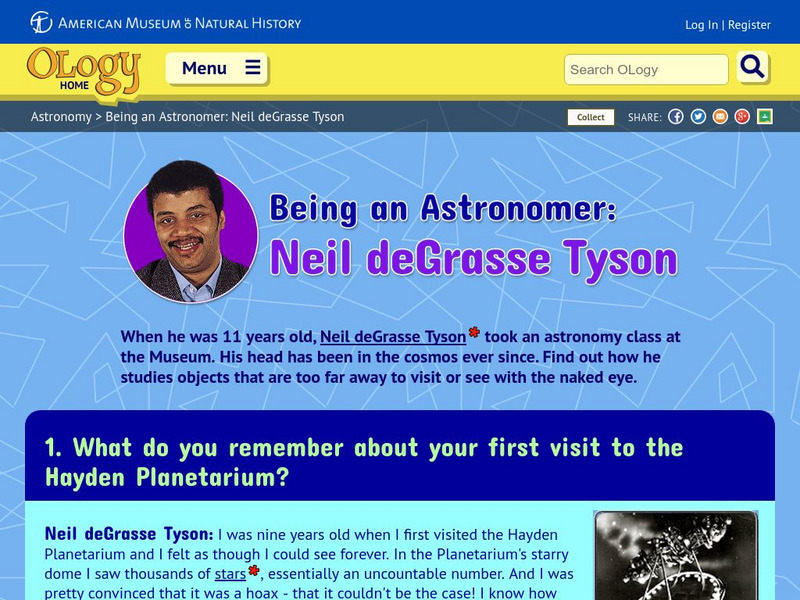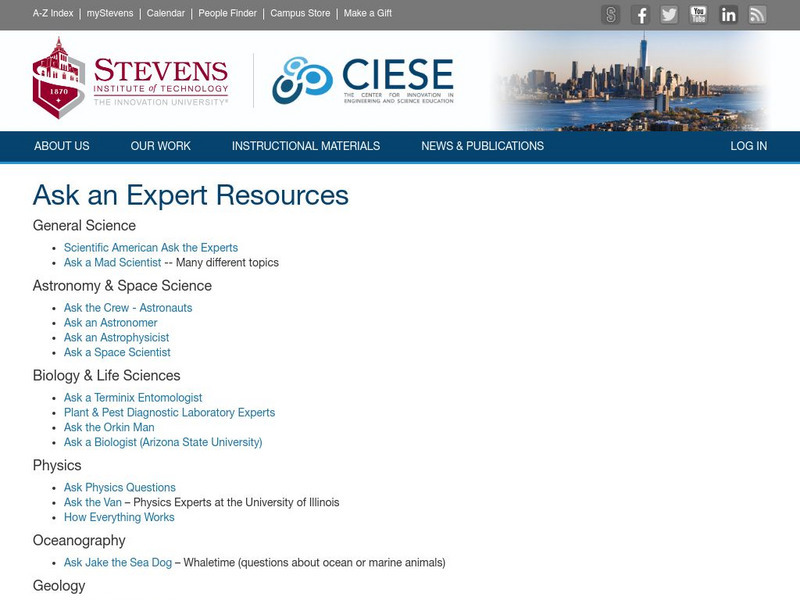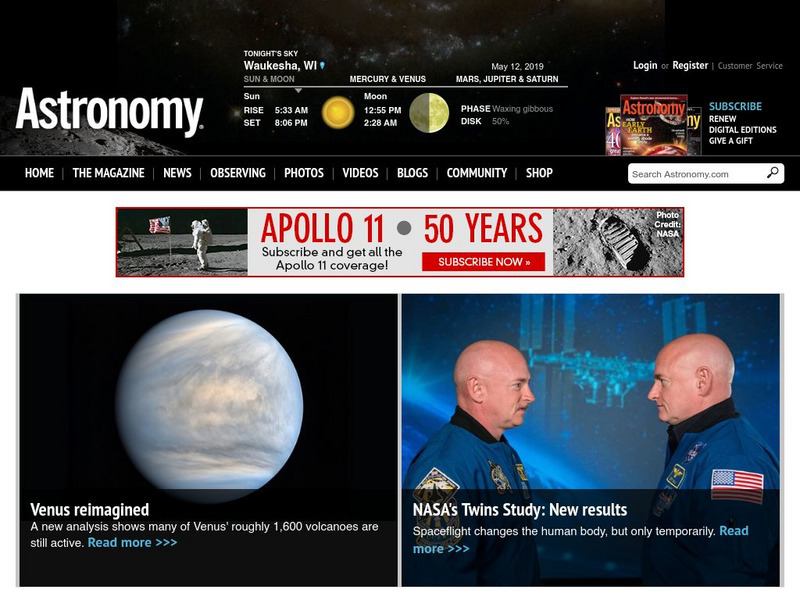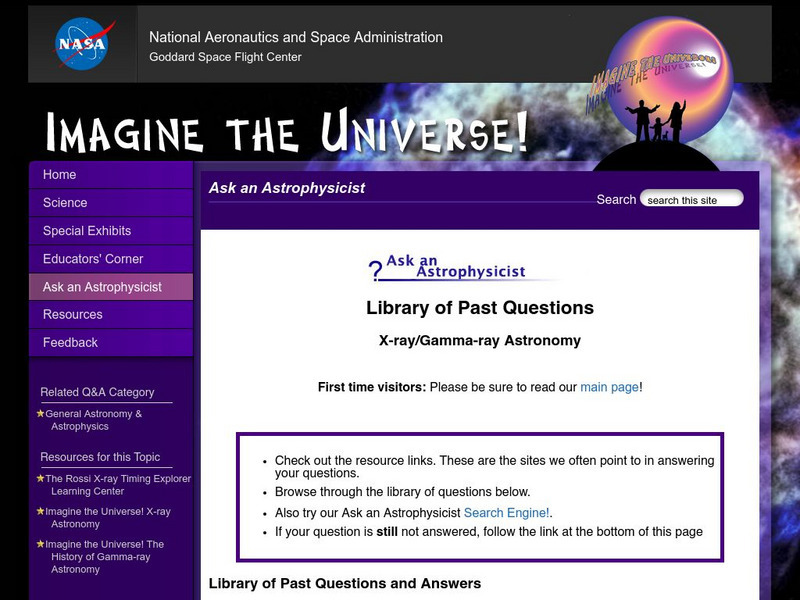Hi, what do you want to do?
American Museum of Natural History
American Museum of Natural History: O Logy: Meet the Astronomer: Neil Tyson
Interview with astronomer Neil de Grasse Tyson provides insights into his research interests, his career preparation, and a range of astronomy-related topics.
American Museum of Natural History
American Museum of Natural History: O Logy: Stuff to Do: Space Travel Guide
What makes science fiction so exciting? Read some examples of the genre and then create your own science fiction story about space travel. Use the supplied "travel guide" to generate ideas and structure your plot.
Center for Innovation in Engineering and Science Education, Stevens Institute of Technology
Ciese: Educational Links: Ask an Expert Sites
Ever wondered about, well, anything? Get your burning question answered here from reigning experts in General Science, Astronomy and Space Science, Biology and Life Sciences, Physics, Oceanography, Geology, Weather, and Health.
Other
Astronomy.com
Astronomy.com offers daily astronomy news, a photo gallery, hobby news, The Sky Online, telescope information, NASA mission guides and much more.
The History Cat
The History Cat: Islamic Science and Math
Describes the major accomplishments of Islamic civilizations in the fields of Science and Math, i.e., the Islamic calendar, astronomy calculations, windmills, irrigation with gears, and mathematical theories.
Ducksters
Ducksters: Astronomy for Kids: Galaxies
Kid's learn about the science of Galaxies. Large groups of stars such as the Milky Way throughout the universe are an interesting part of astronomy.
NASA
Nasa: Imagine the Universe: Welcome to the World of Multiwavelength Astronomy!
This Imagine the Universe site provides an introduction into the multiwavelength universe and astronomy. Site provides graphics, links to a quiz, facts on this topic as well as teacher resources.
Ducksters
Ducksters: Astronomy for Kids: The Planet Jupiter
Kids learn about the planet Jupiter of the Solar System including fun facts, mass, day, year, and distance from the Sun. Astronomy for kids and teachers.
Ducksters
Ducksters: Astronomy for Kids: The Planet Mars
Kids learn about the planet Mars of the Solar System including fun facts, mass, day, year, and distance from the Sun. Astronomy for kids and teachers.
Ducksters
Ducksters: Astronomy for Kids: The Planet Mercury
Kids learn about the planet Mercury of the Solar System including fun facts, mass, day, year, and distance from the Sun. Astronomy for kids and teachers.
Ducksters
Ducksters: Astronomy for Kids: The Planet Neptune
Kids learn about the ice giant planet Neptune of the Solar System including fun facts, mass, day, year, and distance from the Sun. Astronomy for kids and teachers.
Ducksters
Ducksters: Astronomy for Kids: The Planet Saturn
Kids learn about the planet Saturn of the Solar System including its rings, mass, day, year, and distance from the Sun. Astronomy for kids and teachers.
Ducksters
Ducksters: Astronomy for Kids: The Planet Earth
This site is astronomy for kids and teachers! Here students can learn about the planet Earth of the Solar System including fun facts, mass, day, year, and distance from the Sun.
Ducksters
Ducksters: Astronomy for Kids: Black Holes
On this site, you can learn about mysterious powerful forces that absorb light called black holes. Study the science of black holes in outer space.
Science Struck
Science Struck: 8th Grade Creative Science Fair Project Ideas
Ideas for Grade 8 science projects organized into the categories of environment, physics, chemistry, biology, animals, and astronomy.
Stephen Byrne
History for Kids: Ancient Chinese Science
History for Kids overview on the science and innovations of ancient China. Students learn about the significant impact China made on the world with contributions in the fields of astronomy, chemistry, physics, meteorology and seismology.
Wolfram Research
Wolfram Science World: The Julian Calendar
This site from Science World under Wolfram Research contains brief information about the Julian Calendar. The information is factual and interesting, and it also contains links for further information on the subjects.
Ducksters
Ducksters: Kids Science: Learn About the Dwarf Planet Pluto
Kids astronomy. What is Pluto like? How do we know about this dwarf planet?
NASA
Nasa: Imagine the Universe: X Ray, Gamma Ray Astronomy
Frequently asked questions are answered about gamma rays.
Other
Kid Power: Astronomy for Kids
Young children can find facts about the Solar System, the Sun, meteorites, stars, galaxies, planets, our moon, comets, asteroids, and space exploration. Pages offer clear photos and bullet-point information, which is easy to read and...
Ducksters
Ducksters: Astronomy for Kids: Astronauts
Kids learn about the astronauts who travel and explore outer space including spacesuits, fun facts, and famous adventurers like Buzz Aldrin, Yuri Gagarin, and Sally Ride.
PBS
Pbs Teachers: Scientific American: Science in Paradise: Big Dish
Investigate the science of radio astronomy, and create a model of a curved reflecting dish that will work like the Arecibo detector to detect electromagnetic waves. Explore risk using a risk space grid.
Ducksters
Ducksters: Ancient Mesopotamia: Science, Inventions, and Technology
Kids learn about the Science, Inventions, and Technology of Ancient Mesopotamia such as writing, the wheel, astronomy, and government on this site.
NASA
Nasa Space Science Data Archive: Asteroid 253 Mathilde
This site contains facts about the asteroid 253 Mathilde from the National Space Science Data Center at NASA.
Other popular searches
- Astronomy and Space Science
- Space Science Astronomy
- Science Astronomy Stars
- Earth Science Astronomy
- Science Astronomy Graphing
- Life Science Astronomy
- "Astronomy and Space Science























